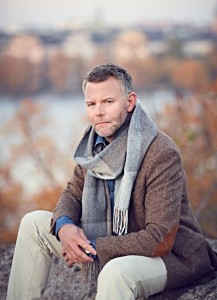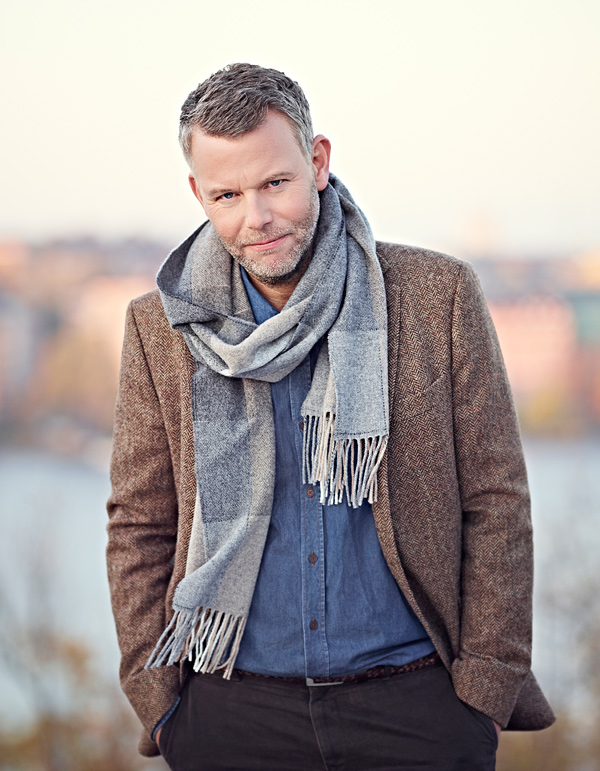An interview with Arne Dahl
We wrote to him on Facebook, he responded at once. The author of Bad Blood and Misterioso answered all our questions readily.
D: You recently had your birthday in January. So, happy birthday! How did you celebrate?
AD: I was actually in Florida doing some writing and research, so it was basically just me and my wife and a lot of crabs. I ate them.
D: You were very easy to reach on Facebook. Is it important for you that people be able to reach and contact you? And in general, how do you feel about the social media phenomenon?
AD: I think it’s very good for the writer – traditionally a very lonely job – to get some idea about what kind of readers he has and what they like. You can pretend to be social in your lonely chamber. But generally it’s a very nice way to tear down the wall between writer and readers. We are closer than ever before. BUT at the same time social media is always a threat, the risk of wasting your time is bigger than ever.
D: You had published previously under your own name, Jan Arnald as well. What kind of woorks did you produce then? Are these likely to be published in Hungarian; do you know of any such plans?
AD: Nobody would be happier than me if some of the Arnald books were translated into Hungarian; I don’t, however, know of any such plans. It’s basically novels with other themes than crime. They could probably be labelled as more literary. They are imaginative novels about such things as love and history, and they have been translated into languages like German, Danish, Estonian. Especially the latest one, called “Intimus” (latin), would suit the Hungarian market fine.
D: Is the Arne Dahl penname meant exclusively for the Intercrime series, or is it possibly to encounter the name on the cover of other crime novels?
AD: Apart from the Intercrime series, there are already a finished second series of four books, about a European police force from Europol. This series includes some of the police officers from the Intercrime series, so it could be seen as a more European and international spinoff from the Intercrime series. I hope my fine Hungarian publishing house will get there soon.
D: It is our understanding that Sweden does not abound in serial killers, the main theme of Misterioso and Bad Blood. What is it that draws you to this theme? Do you see any real danger of such phenomena appearing in Sweden? True, Norway had Anders Behring Breivik…
AD: I can’t say that it’s a real risk of a sudden outburst of serial killers in Sweden. I do believe I use the image of the serial killer in different ways. In Misterioso it’s about a kind of justice that doesn’t really fit into the existing judicial system, basically a kind of revenge. In Bad Blood it’s more about the threat of the culture getting more violent as it gets more Americanised.
D: Were you inspired by existing serial killers? And if so, who?
AD: No, I can’t say I was. In Misterioso the killings are more “spontaneous”, driven by a kind of “fate” more than crazy sickness. But for Bad Blood I read a lot about the infamous American serial killers, because that was basically about imitating a serial killer. I had to imitate a possible imitation (without, I hope, revealing too much…) I also read quite a lot about wartime crimes, torture in the Vietnam war, for example. It wasn’t very nice.
D: Bad Blood is about the sins of fathers – parents perpetrated against their offspring and inherited through generations. Have you had any experiences which may be likened to such a dynamic?
AD: Not personally, no, thank God. But it is a remarkable fact that it is so enormously difficult for a human being (almost entirely men) to step away from a chain of violence and abuse. If you have been abused as a child (boy), you will probably abuse. I think it’s very sad.
D: Confronting the trauma of the Vietnam War is an important theme of American culture, numerous films were born in the 70’s, 80’s and 90’s that dealt with this issue, including Apocalypse Now and several Oliver Stone films. Now, it reappears in Bad Blood. Why Vietnam?
AD: Because it was such a dirty war. Because it was before the “clinical” and high-tech wars of Kuwait, Afghanistan and Iraq, it was much more man-to-man, much more jungle than desert, much more field torture and shit. And because the lasting effects of the fighters involved have been so obvious for a long time. Even those who escaped unharmed were injured for life. And often their children…
D: There is also a lot of discussion about the murder of the literary critic in Bad Blood. Was this perhaps a literary revenge on someone, a skirmish within a feud of the pens?
AD: Well, there was a kind of literary reviewer around at that time that I didn’t like – the besserwisser kind, the alpha male kind that really didn’t like literature, that was more interested in his own ego and cheap ideology than art – so when I needed a cynical guy who got murdered, this was a natural choice. This kind of reviewer has actually more or less disappeared in the last ten years, so I guess my knife hit the right spot.
D: The problems within the private life of Intercrime’s protagonist, Paul Hjelm – his marriage crisis, his affair with a colleague – are almost as important as his cases. This is a recurring motif in Scandinavian crime literature. Do you know what Hjelm’s fate is int he next episodes of the series or do you work all that out as you go along?
AD: There are basically two kinds of stories in the Intercrime series: the shorter ones, the cases, and the longer ones, the stories of the protagonists and their lives. It was really important that the cops were normal people, with normal, contemporary and existential problems, so that I could study the effects of dealing with horrible things. Could they actually stay sane when they spent 10 years surrounded by horrifying violence etcetera? And no, these personal, relational stories were not at all as well-planned as the crime stories, the cases, but evolved much more spontaneous. For me, writing crime fiction is a combination of structure, careful planning, and a lot of freedom. A bit like life itself.
D: Misterioso deals with a previous credit crisis, current a quite a relevant issue with us. Did you or anyone you know have any experiences with the theme of the book?
AD: Once again, not me personally, but it was all around me. It was far too easy to borrow money from the banks, and this is once again the case in Sweden (and I guess most of the world). A lot of people ended up broke. It was a time when money became the protagonist of the world.
D: We read in an article that Jazz music had an influence not only on the plot, but also the structure of Misterioso. Where did the idea come from?
AD: When I listened to jazz music, I felt that this was how you should write really great crime fiction: the perfect mix of solid, original structure that is necessary for the freedom of improvisation. You need the sophisticated structure to be able to feel really free when writing. If you know exactly where you are going, you can go there any way you like. That’s jazz at its best. And that’s crime fiction at its best.
D: How do you feel about other Swedish authors of crime literature? Do you know, perhaps even help each other? In Hungary, Camilla Läckberg and Karin Alvtegen are very popular.
AD: I know both Camilla and Karin, and in general we tend to know each other. The strange thing is that we mostly meet abroad, at international literary festivals and so on. More and more writers are actually starting to write together, getting a little tired of the loneliness of writing, but in general you can’t really say that we are helping each other. There is competition as well. But most of us like each other…
D: I have encountered quite a few Central European voices critical of Scandinavian crime literature, who while saying they recognize its true and undeniable merits, reject it on the grounds that they resent reading about the toils of such a welfare state. Such critics argue that compared to our region – for example to Hungary – which had to endure and survive through a long succession of wars and oppressive political systems throughout the course its history, and as a result, has still to combat poverty, corruption and mass isolation, such themes from rich Scandinavia sound like mere wining. What is your reaction to such opinions?
AD: I have also encountered this opinion, and in a way it makes sense, but if you push it a little further it starts getting weird. Yes, we have been spared from a lot of the monstrosities that you have encountered. In general, we have led easier lives. So we should just write about how easy life has been for us? Or shouldn’t we write at all? Should we even be allowed to speak when we know nothing about pain? And of course the Brits and the Americans – really spoiled people – shouldn’t be allowed to write crime fiction, even if they invented it. Somewhere along this line of thought it became silly, didn’t it?
www.detectivity.hu/english.html
photos: www.arnedahl.net

